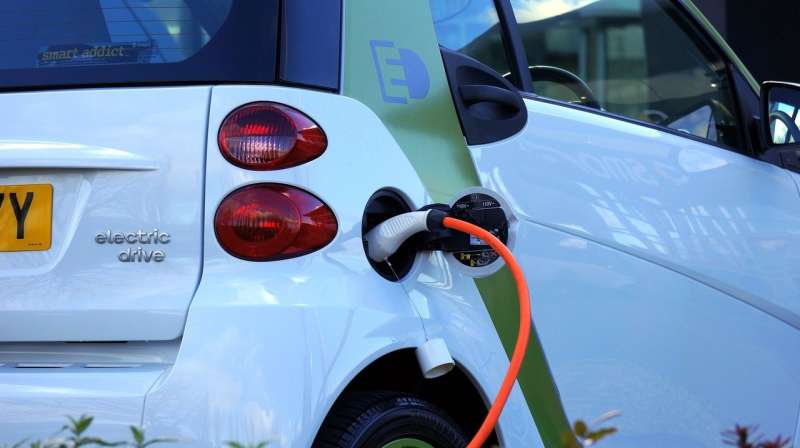This article has been reviewed according to Science X's editorial process and policies. Editors have highlighted the following attributes while ensuring the content's credibility:
fact-checked
trusted source
proofread
Electric vehicles remain a tough sell in Texas, according to new survey

Electric-powered vehicles do not inspire much enthusiasm in Texas, according to a survey released on Nov. 30 by University of Houston and Texas Southern University. Results in the new study reflect only a few shifts in opinions from those voiced by Texans in a similar survey from 2021.
The two studies are parts of the five-year Texas Trends survey series from the UH's Hobby School of Public Affairs and TSU's Barbara Jordan–Mickey Leland School of Public Affairs, which measures attitudes and opinions among the state's changing population.
"Among all our survey respondents, only 5.1% currently drive an electric-powered car, truck or SUV. When we asked that large majority who do not own or lease an electric vehicle, more than half—59.5%—said they wouldn't consider one in the future," Savannah L. Sipole, research associate at UH's Hobby School and an author of this research project.
For almost half of the respondents (46%), scarcity of charging stations was the biggest reason they do not want an electric vehicle (EV). More than a third (38.2%) said their main holdback is the higher purchase prices for the new technology compared to that of gas-powered cars and trucks, while almost as many (36.5%) cited being unable to charge an EV at home.
"Looking closer, we found acceptance levels of electric cars tend to differ according to respondents' ethnicity, income, political affiliation and generation," said Pablo Pinto, director of the Center for Public Policy and distinguished professor at the Hobby School.
For example, just over a quarter of white respondents (27.1%) voiced a likelihood of having an EV in the future. In comparison, more than half of Asian-American (57.6%) and more than a third of Hispanic (36.7%) and Black (35.7%) respondents expressed interest in someday purchasing or leasing an EV.
Considered by income, the survey revealed the greatest level of interest to be among the survey's highest earners, with more than a third (39.3%) of participating households with an annual family income exceeding $80,000 being likely to consider an EV. By comparison, a little more than a fifth of lower-income households reported interest in ever owning or leasing an electric vehicle.
"When we sorted the survey's results according to politics, we found fewer Republicans than Democrats voicing interest in ever having an electric vehicle. A large majority of participants—more than 70% of Republicans and more than 60% of independents—said they were not likely to ever buy or lease an EV," said Robert Lucas Williams, assistant professor of political science at TSU.
Age breakdowns remained little changed from the 2021 study, with Millennials (born 1981–1996) and Generation Z (born 1997–2012) being the most likely generations to anticipate eventually bringing an electric vehicle home.
What would you choose?
In the remaining section, researchers performed a conjoint analysis based on responses to a choice experiment (or conjoint survey experiment) to reveal what factors might tempt them to choose an EV if they were in the market for a new vehicle.
The most influential factor proved to be EVs' driving range on a single charge, followed by price, costs of operation and speed of charging.
But overall, these responses confirmed most Texans' preference for sticking with their gas-powered vehicles. Even a hypothetical combination giving electric vehicles lower purchasing prices, lower operating costs and decreased charging times (compared to what is typically available now) was not enough for respondents to switch loyalty toward electric.
Adding one key factor did tilt the scale: Longer driving range.
If driving distances were longer on an EV's single charge than with a full tank in a gas-powered vehicle—along with hypothetical situation's lowered purchase prices, lowered operating costs and decreased charging times—respondents indicated they would go electric.
The bottom line
With such a small percentage of Texans currently owning electric vehicles, it looks like Texans will hold tight to their gas engines for the foreseeable future. Government incentives, including President Biden's Inflation Reduction Act of 2022, have yet to make a difference among the state's vehicle buyers.
But as charging stations grow in number, costs of operation decrease and—most important, the technology allows longer driving ranges—perhaps electric vehicles will start to earn their place in the garages of Texans.
The Texas Trends 2023: Electric Vehicles survey, which is this year's final addition to the 2023 edition of the Texas Trends survey series, was conducted between Oct. 6 and 18 in English and Spanish with 1,914 YouGov respondents 18 years of age and older, resulting in a weighted confidence interval of +/-2.9 for this report. The respondents were matched to a sampling frame on gender, age, race/ethnicity and education, and are representative of Texas adults.
More information: Survey: uh.edu/hobby/txtrends/2023/



















